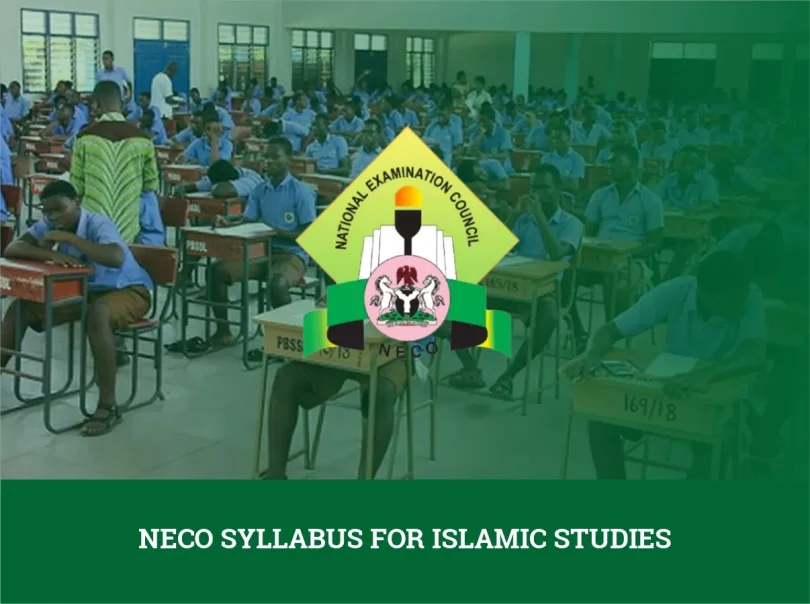If you are preparing for the NECO 2026 examinations and Islamic Studies is one of your subjects, this guide is here to help you. The NECO Syllabus for Islamic Studies has been officially released to show exactly what you need to study. Instead of guessing or studying random topics, this syllabus gives you a clear roadmap of what will be covered in your exams. Knowing the syllabus helps you focus your time and energy on the right areas, so you can prepare smartly and confidently.
In this post, you will find the complete breakdown of the NECO Syllabus for Islamic Studies, including important topics like the life of the Prophet Muhammad (S.A.W.), the Qur’an, Hadith, Islamic practices, and much more. Plus, we will share tips on how to use the syllabus effectively to pass your exams with success.
Keep reading to get all the details you need and start your exam preparation the right way.
Examination Structure
The Islamic Studies examination comprises two main papers:
Paper 1: Objective (Multiple Choice)
- Duration: 50 minutes
- Number of Questions: 50 multiple-choice questions
- Marks: 50 marks
Paper 2: Essay
- Duration: 2 hours
- Number of Questions: 6 questions (1 compulsory and 3 out of 5 optional)
- Marks: 100 marks
NECO Syllabus For Islamic Studies
| Part | Topic | Subtopics |
|---|---|---|
| Part 1: Historical Development of Islam | The Jahiliyyah (Pre-Islamic Arabia) | – Description of Arabia: Location, social, religious, political, and economic life – Reforms introduced by Islam |
| Life of Prophet Muhammad (S.A.W.) | – Birth, marriage, call to prophethood, Hijrah, formation of the Ummah – Leadership qualities, major battles, Treaty of Hudaybiyyah, Conquest of Makkah, Farewell Pilgrimage, and death | |
| The Rightly Guided Caliphs (Khulafā’ ur-Rāshidīn) | – Biographies and contributions of Abu Bakr, Umar, Uthman, and Ali | |
| Islam in West Africa | – Roles of traders, teachers, Sufi orders, and Hajj in the spread of Islam – Impact on socio-political, economic, and linguistic lives in ancient West African empires (Ghana, Mali, Songhai, Kanem-Borno) | |
| Part 2: The Qur’an | Revelation and Preservation | – Circumstances of revelation, compilation, and preservation of the Qur’an |
| Themes and Teachings | – Major themes: Tawhid, prophethood, resurrection, social justice, and morality – Selected Surahs and their meanings | |
| Part 3: The Hadith | Definition and Classification | – Definition of Hadith, categories: Sahih, Da’if, Hasan |
| Major Collections | – Sahih al-Bukhari, Sahih Muslim, Sunan Abu Dawood, Jami’ at-Tirmidhi | |
| Importance and Application | – Role of Hadith in Islamic jurisprudence and daily life | |
| Part 4: Islamic Practices | Five Pillars of Islam | – Shahada, Salat, Zakat, Sawm, Hajj |
| Fiqh (Islamic Jurisprudence) | – Sources: Qur’an, Hadith, Ijma’, Qiyas – Major schools of thought: Hanafi, Maliki, Shafi’i, Hanbali | |
| Islamic Ethics and Morality | – Concepts of halal and haram, honesty, charity, respect for parents, and social justice |
Study Tips for NECO Islamic Studies
- Start your study by carefully going through the NECO Islamic Studies syllabus. It shows exactly what topics you need to focus on, so you don’t waste time studying things that won’t be in the exam.
- Make sure you understand the key topics like the life of Prophet Muhammad (S.A.W.), the Qur’an, Hadith, and the Five Pillars of Islam. Use your class notes and recommended textbooks to study these topics well.
- Try to get past NECO Islamic Studies questions and practice answering them. This helps you get familiar with the kind of questions that come up and how to answer them.
- Writing short notes or drawing mind maps of important topics helps you remember better. For example, you can create a mind map for the Five Pillars of Islam or the major events in the Prophet’s life.
- Talking about what you have studied with classmates or your teacher can help you understand difficult parts better. Don’t be afraid to ask questions if something isn’t clear.
- Create a study schedule that gives you enough time for each topic. Don’t leave everything for the last minute; studying a little every day is more effective.
If you found this post helpful, please share it with others who are also preparing for NECO Islamic Studies. If you have any questions or need more help, feel free to ask in the comments below.
Don’t forget to check our page for syllabi and study guides for other NECO subjects to help you prepare better. Good luck with your exams!







Leave a Comment